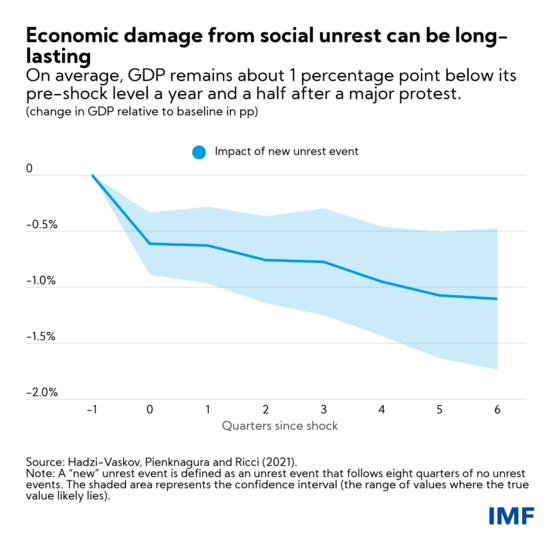Protests driven by the pandemic’s economic fallout are on the rise, with potentially long-lasting economic consequences.
Protests can be catalysts for political reform and social change. But what impact do they have on the economy?
According to the latest Global Peace Index, the number of riots, general strikes and anti-government demonstrations around the world have increased by a staggering 244 percent in the last decade. Lockdowns and fears of contagion forced a temporary lull. But in virtually every region of the world, demonstrators are making a comeback.
Causes range from frustration over governments’ handling of the crisis to mounting inequality and corruption—factors that tend to heighten existing tensions and disparities, and have led to social unrest in the aftermath of previous pandemics.
Using the Reported Social Unrest Index (RSUI)—an index developed by IMF staff based on press coverage—we find that the short to medium-term economic costs of social unrest can in fact be quite large, especially in emerging markets and developing economies (we do not study the potential long-term impacts).
A new wave of unrest could affect the recovery
In our working paper, we estimate the macroeconomic impact of social unrest over the period 1990-2019. In addition, we identify social unrest events—events that create an unusually high increase in the RSUI—and classify these into three categories, based on the underlying cause of the trigger: political, socio-economic and mixed.
To give a real-world example, think of the demonstrations that followed former Mexican President Enrique Peña Nieto’s election in 2012 or Chile’s presidential election in 2013—this is a less significant shock equivalent to one standard deviation, which can reduce GDP by about 0.2 percentage points six months after the shock.
By comparison, the protests of July 2019 in Hong Kong SAR and the yellow vest protests of 2018 in France—which meet the threshold of social unrest events as defined above—resulted in an increase of 4 standard deviations in the RSUI causing a GDP reduction of about 1 percentage point.
These effects on GDP seem to be driven by sharp contractions in manufacturing and services (sectoral dimension), and consumption (demand dimension). Our findings also suggest that social unrest affects activity by lowering confidence and increasing uncertainty.

Not all countries and events are equal
We also find that the adverse impact of unrest is typically larger in countries with weak institutions and limited policy space. Thus, countries with weak fundamentals pre-pandemic are expected to suffer the most should social discontent turn into unrest.
The economic impact of unrest also differs by the type of event: protests motivated by socio-economic concerns result in sharper GDP contractions compared to those associated mainly with politics/elections. Demonstrations triggered by a combination of both socio-economic and political factors—not unlike what we saw in Tunisia and Thailand earlier this year—have the biggest impact.
Policy matters
Public protests can be an important expression of the need to change policy. Governments need to listen and respond, but also try to anticipate people’s needs with policies aimed at giving everyone a fair shot at prosperity. Boosting employment, containing the long-term impact of the crisis and protecting those who have been left behind must remain priorities.
To ensure success and avoid strife, recent IMF staff research notes that reforms require a broad social dialogue on the role of the state and how to sustainably finance budget pressures. Otherwise, the economic costs of the pandemic will likely be compounded by those of the ensuing unrest.








